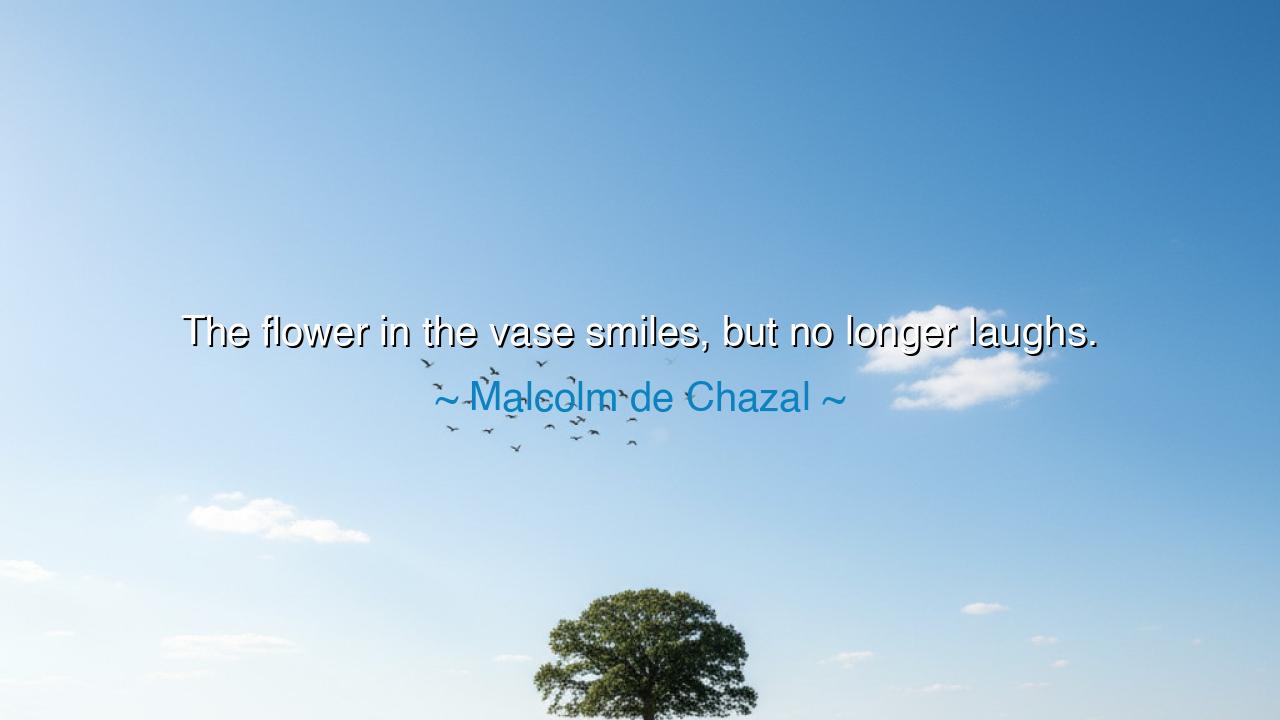
The flower in the vase smiles, but no longer laughs.






The words of Malcolm de Chazal—“The flower in the vase smiles, but no longer laughs.”—are both beautiful and sorrowful, for they capture the paradox of life removed from its source. The flower, though radiant in its petals and still pleasing to the eye, has been severed from the earth that nourished it. It can smile—that is, retain its outer beauty for a time—but it can no longer laugh, for the joy of living, the breath of growth, has been taken away. This is the essence of the quote: appearance without essence, form without spirit, beauty without freedom.
The ancients would have said that the flower in the vase is like the soul bound by worldly ornaments, cut off from its deeper roots. A man may clothe himself in fine robes, speak with polished words, and smile before the world, yet if he is separated from truth, from nature, from the inner wellspring of life, his smile is hollow. It pleases for a time, but it does not endure, for there is no laughter of the spirit within it. The teaching, therefore, warns us against mistaking surface radiance for living wholeness.
Consider the fate of Marie Antoinette, queen of France. Surrounded by luxury, clothed in gowns more splendid than the blooms of spring, she seemed to the world like a flower in a vase—admired, envied, and placed high for all to see. Yet behind the polished smile lay a life cut off from the soil of her people’s suffering. When the Revolution came, her beauty and her courtly grace could not shield her from the truth that she had been preserved in artifice, while the roots of her kingdom withered. Her story reflects the wisdom of de Chazal’s words: without roots in life’s reality, laughter fades, and only the fragile smile remains.
The metaphor also speaks to our own age, where many live as cut flowers—displayed in brilliance but uprooted from the earth of meaning. We adorn our lives with objects, titles, and appearances, and for a moment we smile. But unless we remain connected to the soil of authenticity, of purpose, of love, the deeper joy—the laughter of a free spirit—will be lost. The vase is elegant, but it is a prison; the flower is admired, but it is dying.
Yet, this teaching is not merely lament—it is also guidance. It tells us that to laugh, truly laugh with the joy of being, we must remain rooted. Just as the flower thrives only when bound to the soil that nourishes it, so too must we stay connected to the sources of our vitality: the embrace of nature, the bonds of community, the practices of honesty and integrity, the pursuit of what gives life meaning. Without these, we may still smile, but it will be the smile of the vase-bound flower, beautiful but fading.
The lesson for us is clear: seek depth, not just appearance. In your daily life, do not settle for the smile of surfaces—cultivate the laughter of the soul. Ask yourself: what nourishes me? What keeps my roots alive? Spend time not only on what pleases the eyes of others, but on what strengthens your spirit. Walk among trees, speak with sincerity, love deeply, labor with purpose. In such things lies the soil that feeds true joy.
Practically, one can live this wisdom by embracing habits that keep life authentic. Begin each day with gratitude, for gratitude is water to the soul. Spend less time adorning yourself for display, and more time cultivating the roots of learning, kindness, and connection. When you feel yourself smiling only for show, pause and ask whether your laughter still flows from within. If not, return to your roots before your bloom withers in the vase.
Thus, Malcolm de Chazal’s words, deceptively simple, are a mirror to all of us. The flower in the vase smiles, but no longer laughs—so too may we, if we cut ourselves off from what sustains us. But if we remain rooted in truth, our joy will not only smile—it will laugh, ringing out like living water, eternal and free.






AAdministratorAdministrator
Welcome, honored guests. Please leave a comment, we will respond soon